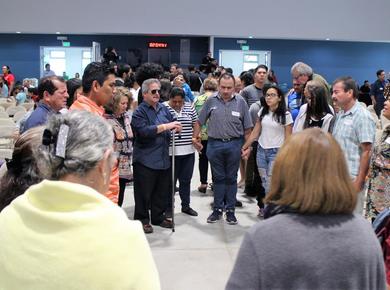Posted: December 7, 2019
Those of us who have seen migration up close know that is an issue that concerns the people of God.
Those who migrate – leaving their security and comfort behind – expose themselves to adversity and an uncertain future. Some who migrate do so voluntarily, but recent history reveals that current migration is usually forced. There are circumstances that oblige people to take the plunge and move in the hope that what happens in the future will be good for them and their family.
For the women who decide to embark on the journey with their under-age children with the purpose of protecting them from a desperate situation, the challenge is so much more difficult. Their effort must double or triple according to the number of children they take along.
The sad part is that on the other side of the wall, the barrier, the border – or whatever other name it has – the solution/promise/idea is nowhere to be found.
In truth, some already know this before they leave, and their attitude evokes a negative response. In a way, doors are closed to them.
The context
According to a survey conducted by the Mennonite Social Action Commission (CASM)*, an average of 250 to 300 people emigrate daily from Honduras. Most people leave due to violence, lack of opportunities, and to be reunited with their families. Among these groups, there are youth who leave with a green code, which means that for various reasons they are destined to die. News articles in the media show that if their migration attempt fails, these youth face a death sentence when they return.
One such youth who was detained and was awaiting deportation back to his country said in an interview: “I know that I am on a hit list. I am here because of my mother and my siblings. It is true that I killed a gang member because he abused my mother and my two sisters. This is why my life is under threat and why we came. It doesn’t matter if they kill me; what matters is that my family is safe.”
Another reality is the drama that people who are deported have to go through.
They are not even granted the right to change their clothes when they go back. When they are imprisoned, the dirty clothes they are wearing are taken and replaced with a prison uniform, as if migrating were a crime and not a basic human right. When they are released after two or three months, their dirty clothes are returned. These are what they must don as they are immediately pushed out.
Women and children arrive crying. Mothers who only 20 days before gave birth come on a journey that involves 14 hours of travel from Mexico.
The Scriptures
This is the reality that we are faced with and that you and I can and should do something about.
The question is: what do we want to do? Well… each of us chooses how to respond to the situations in life based on our role as church leader, community leader, political leader, family, pastor, friend or citizen.
For the children of God, we know that God requires love and obedience of us.
“When an alien resides with you in your land, you shall not oppress the alien” (Levíticus 19:33).
But I didn’t oppress them; all I did was close my door. It is my right. I am only freeing myself from threats because they can attack me.
I don’t know what could be a good and socially acceptable excuse, even in a church context.
The reality is that as Christians we don’t do what we want to do, but rather what we should do. The Word of God is clear about this specific situation.
How should I behave in the face of the migration issue?
“I was a stranger and you welcomed me” (Matthew 25:35).
Through the Word, God calls us to act in a way that sensitizes us: with empathy.
Personally, I think that this is the best way to understand the lived reality of people who migrate. When I attempt to understand what a person could be feeling, I connect with the Word of God that says: “For you were aliens in the land of Egypt” (Leviticus 19:34a).
In other words, you also know what it feels like when you are not in your territory, away from the comfort of your house.
Conclusion
We need to provide love, in order to be in solidarity in the best possible way with people who have no other option but to migrate and are suffering the consequences. Even though we are not affected now, we may be one day. We must assume a position toward this social problem, and the best one would be to obey the Word of God by providing a place to stay, not oppressing people, and putting ourselves in their shoes.
—Adriana Belinda Rodríguez is married and is a psychologist who is part of the Peace Commission. She is also a theology student at SEMILLA and a member of the Mennonite Church “Caminando con Dios” (Walking with God) in La Ceiba, Honduras, where she participates in the teaching. She directs the social service organization of the Honduran Evangelical Mennonite Church known as the Peace and Justice Project that promotes a culture of peace.
She presented a dissertation at Renewal 2027 held in San Rafael de Heredia, Costa Rica on the 6th of April 2019. This article is an adaptation of her presentation titled, “In search of Justice: Migration in the Anabaptist-Mennonite History.”
La Comisión de Acción Social Menonita (CASM – Mennonite social action commission) is an ecumenical organization that works to strengthen democratic processes and regional and local development in Honduras.
This article first appeared in Courier/Correo/Courrier October 2019.

Join the Conversation on Social Media
FacebookTwitterInstagramFlickrYouTube